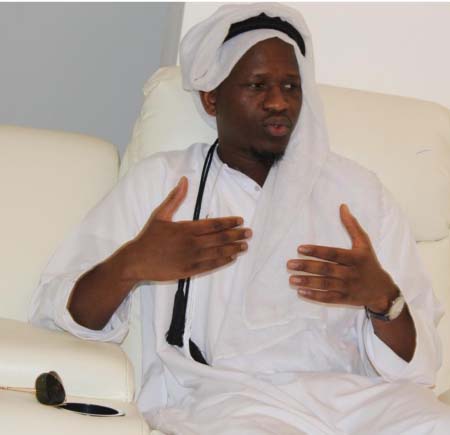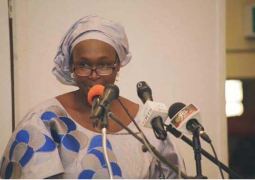
HRH Prince Ebrahim Sanyang, one of Africa’s foremost investors and entrepreneurs, on 20 January 2015 delivered a speech on future business relations between Britain and Africa at Institute of Directors (IoD), where he delved on very important issues including the pertinent question of ‘how can Africa’s economy be transformed for good?’
Prince Ebrahim, a Gambian, is chairman of Royal Africa Holdings, an Africa-focused diversified investment holding company with over US$8 billion in pipeline development projects, assets and portfolios across Africa. An excerpt of his speech is relayed below:
How can we transform Africa’s Economy for Good?
African economies have sustained unprecedented rates of growth in the past decade. This growth was mainly driven by exports of natural resources and commodities, improved macroeconomic management, a growing middle class, and increased domestic demand fuelled by consumption and increased political stability.
However, Africa’s growth has not been inclusive, as poverty rates and inequalities remain somewhere/somehow high. In order to foster growth inclusiveness, African economies should shift from low- to high-productivity activities and sectors.
Therefore, Africa needs to sustain a structural transformation from a resource-based economy towards an industry- or service-based economy. Only a few African countries, including Mauritius, South Africa and Uganda, have succeeded in structurally transforming their economies. Other African countries experienced some degree of structural transformation following different paths and at different speeds. Some countries may transform through low-wage manufacturing while others may transform through services or the agricultural sector. Africa has experienced a delayed structural transformation: labour is not moving out of agriculture to other more productive industrial or services sectors fast enough and the share of agriculture in GDP is declining too fast. This was mainly explained by the lack of inclusive agricultural policies and the non-effective industrialization strategies of most African countries.
Structural economic change is indispensable to achieve the desired progress of Africa and to bring prosperity to the continent’s populations. In order to alleviate poverty and reduce income inequalities, Africa will need to embrace structural transformation while maintaining robust economic growth. Fostering diversification through transition to high-productive sectors will be a catalyst for industrial upgrading and technological innovation which in turn will increase job creation. The path toward obtaining the status of middle-income and high-income countries will necessitate diversifying African economies away from dominant sectors such as agriculture and commodities.
We need to Foster Structural transformation in Africa…
Achieving structural transformation will involve a greater degree of industrialization of African economies which no doubt British businesses can play a vital role. The agriculture sector should remain central to African economies in any process of transition. Fostering innovation and regional integration would also be very important for an effective transformation of the continent.
How Can Africa industrialise?
For a successful structural transformation, the African continent needs industrialization to create jobs, increase incomes and foster economic diversification. A commodity-based industrialization could be very useful in assuring the success of Africa’s structural transformation. In fact, using the endowment and potential of Africa in terms of natural resources to foster the industrial sector could be a more effective way to structurally transform the continent than focusing only on diversifying the economy away from commodities.
My Views on Agricultural development…
The agricultural sector is a dominant economic sector in many African countries and employs a majority of Africa’s population. It is a major source of revenue for households as well for savings and investments. African policy-makers should be aware that the transition toward an economy based on industry or services does not mean neglecting the strategic agricultural sector. Developing agriculture in Africa by industrializing it or by making it more innovative and more competitive is essential for eradicating food insecurity and hunger on the continent. Growing domestic demand for food in Africa is an opportunity to foster the role of the agricultural sector. I will personally lobby Authorities in Africa to lower agricultural taxation, encourage the development of large-scale farming, and strengthening regional agriculture institutions.
How do we Foster innovation inline with Africa’s Development?
Structural transformation requires innovation to overcome deficiencies in what regard infrastructural development. Good knowledge of industrial value chains (as in case of Britain) and structures are prerequisite for an effective transformation of African economies. Investing continuously in education, training, improvement of skills and technological innovation is imperative to prepare the ground for a successful industrial transformation. Innovation will help build the capacity to produce more sophisticated products with high added value. British innovation is highly needed for a better market positioning and competitiveness for African goods of origin at the global markets
Paramount Significance for Regional integration
The process of transition towards an economy based on industry and services cannot meet its targets without the mobilization of substantial resources. Despite the fact that most African countries are well endowed in terms of resources, these resources will not be sufficient for structural transformation. In this context, regional integration among African countries would be essential to mobilize the needed resources for the whole region. Regional integration will accelerate structural transformation through achieving economies of scale and enhancing competitiveness of African economies. I strongly belief my new initiative will significantly help in realizing a timely solutions to aforementioned regional integration.
Structural Transformation: PEFAF’s Role…
Structural transformation is at the heart of PEFAF. A far as I am concern, transforming the economy of the continent involves expanding sources of growth and productivity to achieve an inclusive economic development. Fostering employment especially among young people and women could be achieved through structural transformation of African economies.
The acceleration of economic transformation in Africa would be achieved by unlocking the potential of youthful population and boosting investments in innovation and new technologies. In order to achieve a smooth structural transformation, human development through education and training should be among the top priorities for Africa. Also, empowering women and youth and strengthening governance institutions could further promote a structural transition towards high productivity activities on the continent.



